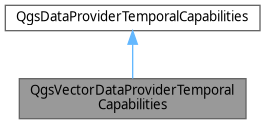Implementation of data provider temporal properties for QgsVectorDataProviders. More...
#include <qgsvectordataprovidertemporalcapabilities.h>

Public Member Functions | |
| QgsVectorDataProviderTemporalCapabilities (bool enabled=false) | |
| Constructor for QgsVectorDataProviderTemporalCapabilities. | |
| const QgsDateTimeRange & | availableTemporalRange () const |
| Returns the datetime range extent from which temporal data is available from the provider. | |
| QString | endField () const |
| Returns the name of the end datetime field, which stores the end time for the feature's time spans. | |
| Qgis::VectorDataProviderTemporalMode | mode () const |
| Returns the temporal properties mode. | |
| void | setAvailableTemporalRange (const QgsDateTimeRange &range) |
| Sets the datetime range extent from which temporal data is available from the provider. | |
| void | setEndField (const QString &field) |
| Sets the name of the end datetime field, which stores the end time for the feature's time spans. | |
| void | setMode (Qgis::VectorDataProviderTemporalMode mode) |
| Sets the temporal properties mode. | |
| void | setStartField (const QString &field) |
| Sets the name of the start datetime field, which stores the start time for the feature's time spans. | |
| QString | startField () const |
| Returns the name of the start datetime field, which contains the start time for the feature's time spans. | |
 Public Member Functions inherited from QgsDataProviderTemporalCapabilities Public Member Functions inherited from QgsDataProviderTemporalCapabilities | |
| QgsDataProviderTemporalCapabilities (bool available=false) | |
| Constructor for QgsDataProviderTemporalCapabilities. | |
| virtual | ~QgsDataProviderTemporalCapabilities ()=default |
| bool | hasTemporalCapabilities () const |
Returns true if the provider has temporal capabilities available. | |
| void | setHasTemporalCapabilities (bool available) |
| Sets whether the provider has temporal capabilities available. | |
Detailed Description
Implementation of data provider temporal properties for QgsVectorDataProviders.
Data provider temporal capabilities reflect the temporal capabilities of a QgsDataProvider. Unlike QgsMapLayerTemporalProperties, these settings are not user-configurable, and should only be set by the QgsDataProvider itself.
- Since
- QGIS 3.14
Definition at line 37 of file qgsvectordataprovidertemporalcapabilities.h.
Constructor & Destructor Documentation
◆ QgsVectorDataProviderTemporalCapabilities()
| QgsVectorDataProviderTemporalCapabilities::QgsVectorDataProviderTemporalCapabilities | ( | bool | enabled = false | ) |
Constructor for QgsVectorDataProviderTemporalCapabilities.
The enabled argument specifies whether the data provider has temporal capabilities.
Definition at line 20 of file qgsvectordataprovidertemporalcapabilities.cpp.
Member Function Documentation
◆ availableTemporalRange()
| const QgsDateTimeRange & QgsVectorDataProviderTemporalCapabilities::availableTemporalRange | ( | ) | const |
Returns the datetime range extent from which temporal data is available from the provider.
- See also
- setAvailableTemporalRange()
Definition at line 43 of file qgsvectordataprovidertemporalcapabilities.cpp.
◆ endField()
| QString QgsVectorDataProviderTemporalCapabilities::endField | ( | ) | const |
Returns the name of the end datetime field, which stores the end time for the feature's time spans.
- See also
- setEndField()
- startField()
Definition at line 58 of file qgsvectordataprovidertemporalcapabilities.cpp.
◆ mode()
| Qgis::VectorDataProviderTemporalMode QgsVectorDataProviderTemporalCapabilities::mode | ( | ) | const |
Returns the temporal properties mode.
- See also
- setMode()
Definition at line 25 of file qgsvectordataprovidertemporalcapabilities.cpp.
◆ setAvailableTemporalRange()
| void QgsVectorDataProviderTemporalCapabilities::setAvailableTemporalRange | ( | const QgsDateTimeRange & | range | ) |
Sets the datetime range extent from which temporal data is available from the provider.
- See also
- availableTemporalRange()
Definition at line 35 of file qgsvectordataprovidertemporalcapabilities.cpp.
◆ setEndField()
| void QgsVectorDataProviderTemporalCapabilities::setEndField | ( | const QString & | field | ) |
Sets the name of the end datetime field, which stores the end time for the feature's time spans.
- See also
- endField()
- setStartField()
Definition at line 63 of file qgsvectordataprovidertemporalcapabilities.cpp.
◆ setMode()
| void QgsVectorDataProviderTemporalCapabilities::setMode | ( | Qgis::VectorDataProviderTemporalMode | mode | ) |
Sets the temporal properties mode.
- See also
- mode()
Definition at line 30 of file qgsvectordataprovidertemporalcapabilities.cpp.
◆ setStartField()
| void QgsVectorDataProviderTemporalCapabilities::setStartField | ( | const QString & | field | ) |
Sets the name of the start datetime field, which stores the start time for the feature's time spans.
If mode() is ModeFeatureDateTimeInstantFromField, then this field stores both the start AND end times.
- See also
- startField()
- setEndField()
Definition at line 53 of file qgsvectordataprovidertemporalcapabilities.cpp.
◆ startField()
| QString QgsVectorDataProviderTemporalCapabilities::startField | ( | ) | const |
Returns the name of the start datetime field, which contains the start time for the feature's time spans.
If mode() is ProviderStoresFeatureDateTimeInstantInField, then this field stores both the start AND end times.
- See also
- setStartField()
- endField()
Definition at line 48 of file qgsvectordataprovidertemporalcapabilities.cpp.
The documentation for this class was generated from the following files:
- /home/fischer/src/qgis-3.38/src/core/vector/qgsvectordataprovidertemporalcapabilities.h
- /home/fischer/src/qgis-3.38/src/core/vector/qgsvectordataprovidertemporalcapabilities.cpp